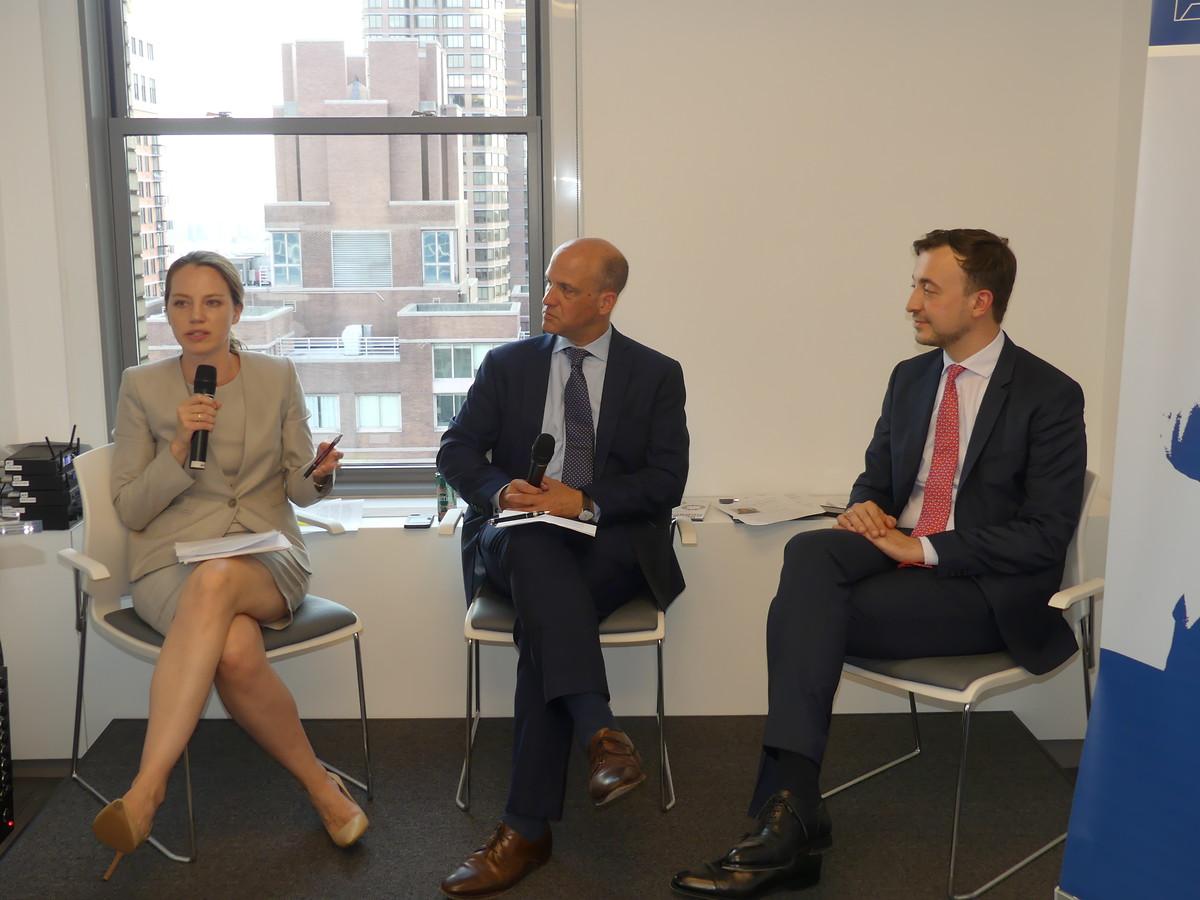Veranstaltungsberichte
Multilateralism and international governance systems are increasingly contested by populist movements emphasizing nationalism over shared goals and common values. The value systems developed after the Second World War and taken as universal achievements cannot be taken for granted anymore; the next generation of leaders on both sides of the Atlantic is grappling with a new world order. Two of such young leaders, each on one side of the Atlantic are Paul Ziemiak, Member of the German Bundestag (CDU) and Federal Chairman of the Junge Union and Frances A. Devlin, American Council on Germany (AGC) Board Member and Director of Global Policy & International Public Affairs at Pfizer. On September 4th KAS New York had the pleasure to welcome these two multipliers alongside the American Council on Germany to debate current challenges to multilateralism and expectations for Germany’s global engagement.
Most of the problems we deal with today are on a global scale, explained MP Ziemiak. With regards to security, the Junge Union is willing to raise NATO contributions to 2% of GDP, potentially even exceeding this target. It is imperative, underlined Ziemiak, that Germany stands up confidently for the safety of Eastern European countries. Whether it be with regards to energy security or trade, Germany – as well as the European Union – deeply appreciate the value-based partnership with the United States. Asked about an increasing political disengagement and skepticism permeating from youth on both sides of the Atlantic, Ziemiak stressed common transatlantic values and explained that a deep routed friendship will outlast current challenges and daily politics. He underlined the importance of engaging young people in the political discourse and offering them the opportunity to challenge politicians with tough questions to rebuild trust.
Within the United Nations MP Ziemiak underscored Germany’s commitment to go beyond monetary support. With regards to Germany’s non-permanent seat on the UN Security Council in 2019, Berlin is dedicated to focus on conflict prevention in accordance with the Secretary-General’s priorities and to reduce conflict by prioritizing political solutions over military approaches.
Ms. Devlin, speaking from the perspective of a multinational biopharmaceutical company, explained that Pfizer is a testament of transatlantic partnership. Germany – a powerhouse of export – is a case in point when it comes to the vital linkage between groundbreaking scientific findings and a robust value system. Germany has the highest share of patent employment and the highest number of patent applications, making it the global voice of intellectual property. Open trade, multilateralism, market freedom, civic principles and a rules-based system, all elements for which Germany stands, are fundamental for scientific progress and innovation. If the current erosion of the transatlantic value system continues and if political systems continue to fragment, the legacy of partnership and innovation is under a serious threat. For this reason, Germany needs to take a leading role on ensuring a framework under which scientific research is safeguarded and invested into. As Germany is a global front-runner in the private-public health system, the country needs to take center stage on how to model growth and innovation while allocating resources to Research and Development (R&D). As health is considered a security issue today, the world expects Germany to take on a leading role in global public health, shaping an agenda that allows inclusion of the private sector and partnership through multilateralism. From the perspective of a multinational biopharmaceutical company like Pfizer, Devlin explained that economic ties that permeate all parts of the globe develop security as well as stability and enable an appropriate health response for patients.
In the subsequent discussion it became evident that albeit many are looking towards Germany as the leader of the European Union and the guarantor of its stability, Germany first and foremost aims to be a reliable partner in a rules-based multilateral system.







